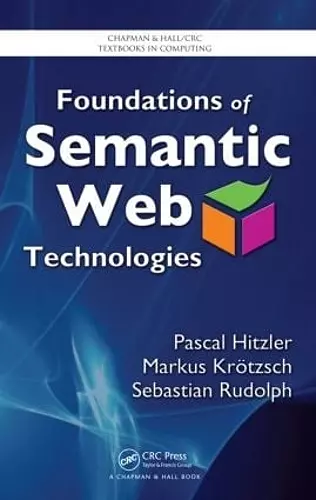Foundations of Semantic Web Technologies
Sebastian Rudolph author Pascal Hitzler author Markus Krötzsch author
Format:Hardback
Publisher:Taylor & Francis Ltd
Published:6th Aug '09
Currently unavailable, and unfortunately no date known when it will be back

With more substantial funding from research organizations and industry, numerous large-scale applications, and recently developed technologies, the Semantic Web is quickly emerging as a well-recognized and important area of computer science. While Semantic Web technologies are still rapidly evolving, Foundations of Semantic Web Technologies focuses on the established foundations in this area that have become relatively stable over time. It thoroughly covers basic introductions and intuitions, technical details, and formal foundations.
The book concentrates on Semantic Web technologies standardized by the World Wide Web Consortium: RDF and SPARQL enable data exchange and querying, RDFS and OWL provide expressive ontology modeling, and RIF supports rule-based modeling. The text also describes methods for specifying, querying, and reasoning with ontological information. In addition, it explores topics that are clearly beyond foundations, such as tools, applications, and engineering aspects.
Written by highly respected researchers with a deep understanding of the material, this text centers on the formal specifications of the subject and supplies many pointers that are useful for employing Semantic Web technologies in practice.
The book has an accompanying website with supplemental information.
A 2010 CHOICE Outstanding Academic Title
… The nine chapters of the book guide the reader through the major foundational languages for the semantic Web and highlight the formal semantics. … the book has very interesting supporting material and exercises, is oriented to W3C standards, and provides the necessary foundations for the semantic Web. It will be easy to follow by the computer scientist who already has a basic background on semantic Web issues; it will also be helpful for both self-study and teaching purposes. I recommend this book primarily as a complementary textbook for a graduate or undergraduate course in a computer science or a Web science academic program.
—Computing Reviews, February 2010
This book is unique in several respects. It contains an in-depth treatment of all the major foundational languages for the Semantic Web and provides a full treatment of the underlying formal semantics, which is central to the Semantic Web effort. It is also the very first textbook that addresses the forthcoming W3C recommended standards OWL 2 and RIF. Furthermore, the covered topics and underlying concepts are easily accessible for the reader due to a clear separation of syntax and semantics … I am confident this book will be well received and play an important role in training a larger number of students who will seek to become proficient in this growing discipline.
—From the Foreword, Amit Sheth, Wright State University, Dayton, Ohio, USA
ISBN: 9781420090505
Dimensions: unknown
Weight: 800g
456 pages